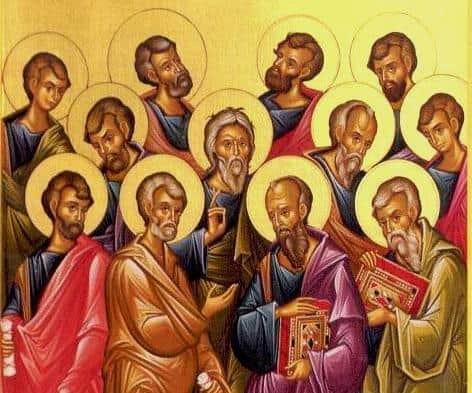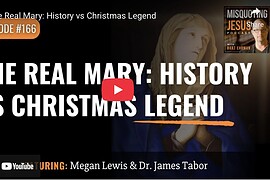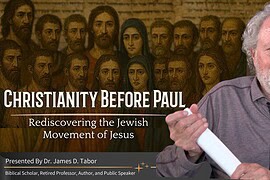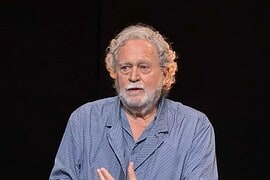This post is continued from the previous one here. Here are the last three in this two-part posting. You will find a full exposition of these ideas, chapter by chapter, in my book Paul and Jesus.
 At the Recently Discovered “Tomb of Paul” in Rome
At the Recently Discovered “Tomb of Paul” in Rome
4) Already but Not Yet. Paul operated with strongly apocalyptic perspective that influenced all he said or did. He was quite sure that he and his followers would live to see the return of Christ from heaven. Life in the world would go on, but not for long. Everything was soon to be transformed. At the same time there was a sense in which everything continued as it was. As Paul tried to work out the practical ethical and social implications of these ideas he pressed hard against the realities of time and history. Paul states emphatically that the “appointed time has grown very short,” and he advised his followers not to marry, begin a new business, or worry if they were slaves, since everything in the world was about to be turned upside down and all social relations were terminal. Right up until the end of his life he expected to live to see the great event—what he called the “Arrival” (Greek parousia)—the visible appearance of the heavenly Christ in the clouds of heaven to usher in the events of the final Judgment. He tried to inspire his followers to live as ifthe new spiritual transformation had already arrived, all the time knowing that its full realization was not yet. The tensions between life in the world with its inarguable realities of sex and marriage, birth and death, and ethnic and social identities, were difficult to negotiate as ifthey no longer were operative. It was one thing to say that in Christ all such demarcations had passed, but it was quite another to try to live ones life in a world that remained the same.
5) Under the Torah of Christ. As a Jew Paul decisively turned his back on the Torah revelation given to Moses on Mt. Sinai, with all of its laws, customs, and traditions. In other words, Paul abandoned his Judaism. He would have never put it that way, though, since what he advocated he called a new and true Judaism, making the first obsolete. He maintained the Torah had now been replaced and superseded by the new Torah of Christ (Galatians 3:23-26). He never denied that the one God of Israel, who had sent Jesus and glorified him as Son of God, had once spoken through Moses and the Prophets. What he insisted upon was that alongside the one God of Israel was an exalted heavenly Lord Jesus, to whom the whole cosmos would be in obeisance. He also believed that the new revelations he was receiving as the Thirteenth Apostle made anything that had gone before pale by contrast (Galatians 3:7-9). For Paul there was no comparison between what the Torah of Moses promised the nation of Israel—physical blessings of prosperity, well-being, and peace—with the incomparable spiritual glory now promised to those destined to be part of the new cosmic heavenly family of glorified children of God. This process of cosmic birthing constituted a new spiritual “Israel,” a new covenant, and a new Torah, replacing the old.
What Paul proposed as a replacement of the Torah of Moses he called the Torah of Christ. It was not a legal code, written in stone or on parchment, but a manifestation of the Christ-Spirit in those who had been united with Jesus through baptism, both Jews and non-Jews. It was this agency of the Spirit that defined the new Israel and enabled the select group to have both the motivation and the power to struggle against “the flesh.” In contrast, the Law of Moses was powerless to actually deliver anyone from the power of sin that had its root in the flesh, since all it could do is propose what was good. Paul put his own “life in the Spirit” forward as the model for his followers to imitate and was often disappointed in their seeming inability to “walk in the Spirit,” since they failed to exhibit even the minimum standards of righteous behavior.
6)The Battle of the Apostles. Paul understood his own role as an apostle, “last but not least,” as he put it, as the essential and pivotal element in God’s cosmic plan to bring about the salvation of the world through Christ. Though he expressed grief over his former life as an opponent and persecutor of the Jesus movement, stressing that he was unworthy even to be an apostle, he nonetheless believed that his call to be an apostle was a singular and extraordinary event (1 Corinthians 15:9-10). Unlike the other apostles who had been chosen by Jesus at the beginning of his preaching in Galilee, Paul believed that he had been set apart and called before he was even born—while still in his mother’s womb (Galatians 1:15). Given this perspective one might conclude that rather than being last, Paul was chosen before all the others. His “conversion” then, would just be a matter of God determining the time was right. As Paul puts it: God chose to “reveal his Son to me” (Galatians 1:16).

This places him in a rather extraordinary position with reference to the original apostles, since he understood that his singular position as the “Thirteenth Apostle,” was to take the message about Christ to the non-Jewish world. This special mission, he believed, was essential for him to complete before the end of the age could arrive. Just as Christ was sent to his own people, the Jewish nation, to confirm the promises given to the patriarchs, Paul, as a kind of “second Christ,” was commissioned to go to the entire world (Romans 15:8-9). He believed that his specific role as an “apostle to the Gentiles” had been prophesied by Isaiah and that he, as a Suffering Servant, along with Christ, would also pour out his blood as an offering, and thus “fill up what is lacking in Christ’s suffering” (Philippians 2: 17; Colossians 1:24; Isaiah 49:1-6).
Paul’s relationship with the original apostles was sporadic and minimal. He is emphatic about this point, swearing with an oath to his followers that his Gospel message that he received directly from Christ came as a heavenly revelation and was not in any way derived from consulting with, or receiving authority from, the original Jerusalem apostles (Galatians 1:16-18). Paul spoke of the Jerusalem leadership sarcastically, referring to James, Peter, and John as the “so-called pillars,” and “those reputed to be somebody,” but adds, “what they are means nothing to me” (Galatians 2:6, 9). At the same time he insists that they gave him the right hand of fellowship and wished him well in his mission. It is possible that the leaders in Jerusalem had initially reached some sort of “live and let live” working agreement with Paul. His work, which was almost exclusively with non-Jews, would not interfere with their own preaching to Jews.
Sometime in the mid-to-late 50s A.D. Paul made a clear and decisive break with the Jerusalem establishment. In one of his last writings, an embedded fragment of a letter now found in 2 Corinthians, he declares “I am not the least inferior to these super-apostles,” and ends up calling them “false apostles, deceitful workmen, disguising themselves as apostles of Christ” (2 Corinthians 11:6, 13). He had also become terribly bitter against his fellow Jewish Christians who maintained their Jewish faith: “Look out for the dogs, look out for the evil-workers, look out for those who mutilate the flesh,” sarcastically referring to the practice of circumcision (Philippians 3:2). Tradition has it that Paul ended up in prison in Rome alone with few supporters (2 Timothy 4:16).
Most scholars have interpreted this bitterly denunciatory language as directed against a group of unnamed Jewish opponents, not the Jerusalem apostles. I think this is mistaken. The radical nature of the break that took place between Paul and the original apostles is so threatening to our most basic assumptions about Christian origins that it is easy to think that it just can’t be true, but the evidence is there. Unfortunately, outside of Paul’s letters there is little in the New Testament to document it further. After all, the entire New Testament canon is largely a post-Paul and pro-Paul production. But Paul himself provides his side of the story and that is more than enough to reconstruct what happened. Fortunately a few additional sources outside the New Testament writings have survived that support what we can construct as the other side of the story. They provide us with solid evidence of just how bitter and sharp the break between the Jerusalem apostles and Paul became.
If some of the elements of this brief overview of my analysis of Paul seem strange and unfamiliar to readers that should be no surprise. Paul proved too radical, too apocalyptic, and too controversial even for the emerging Church in the 2nd through the 4th centuries. He was domesticated, first by the author of Acts, as I have noted, but subsequently by letters written in his name, purporting to be from his hand, that are found in the New Testament. Paul was appropriated as a hero, a courageous preacher, and a martyr, who was responsible for taking the gospel beyond the Jewish world, but the radical content of his message, and his view of his unique calling and mission, was lost to subsequent generations of Christians. What Paul most expected to happen never came about and his grand vision of the imminent transformation of the world, and his pivotal role therein, utterly failed. The Paul who was appropriated over the centuries was a theological Paul, particularly as understood by Augustine and Luther. Paul was removed from his historical context and recast in terms of the great doctrines of Christianity, namely, predestination, justification by grace through faith, reconciliation, redemption, sanctification, and eternal life. The ethical teachings of Paul also had a practical and enduring legacy, from his incomparable celebration of the primacy of love in 1 Corinthians 13, to his views of women, sexuality and marriage, divorce, other social and societal issues. The thirteen letters attributed to Paul in the New Testament make up nearly one-quarter of the New Testament and they are the primary documents that have shaped the course of Catholic, Greek Orthodox, and Protestant Christianity.[i]
Jesus will always be the center of Christianity but the “Jesus” who most influenced history was the “Jesus Christ” of Paul, not the historical figure of Jesus. There is a double irony here. Paul became the most influential defining figure for later Christianity, even beyond the historical Jesus, but he is also a man waiting to be discovered, even after nearly two thousand years. Paul transformed the man Jesus, with his message of a messianic kingdom of justice and peace on earth to a religion of otherworldly salvation in a heavenly world. Recovering the authentic Paul, as he was in his own time, and from his own words, is my task. All of us, whether Christian or not, whether wittingly or unwittingly, are heirs of Paul, since the parameters of Christ and his heavenly kingdom, created by Paul, were what shaped our civilization.
[i]The thirteen letters attributed to Paul make up approximately 32,500 of 138,000 total words, see Steve Mason, “Methods and Categories,” at https://www.bibleinterp.com/articles/mason3.shtml









Comments are closed.